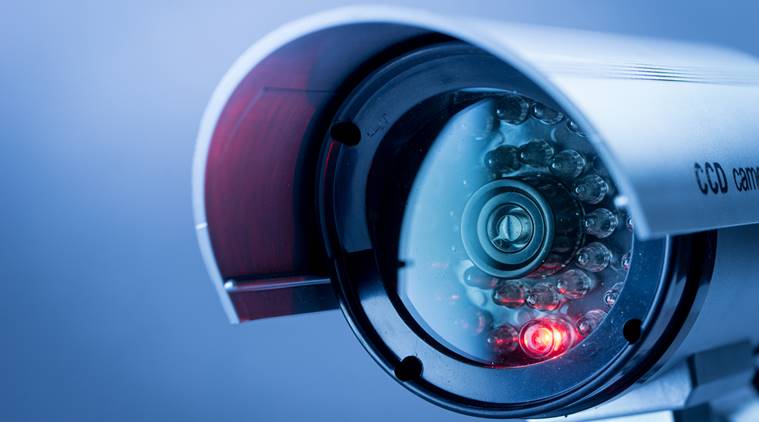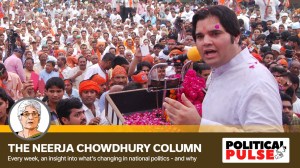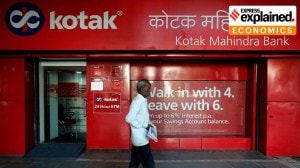- India
- International
Vadodara police proposes CCTV cameras, GPS in school vehicles
The circular stated that in case of any objections, the concerned parties may approach the Police Commissioner within the next 30 days.
 The circular further stated that live feed of the installed cameras and live location of the vehicles be shared with parents or guardians of the students, as well as the respective school managements on their mobile phones, laptops or desktops (Photo: Representational image/Thinkstock)
The circular further stated that live feed of the installed cameras and live location of the vehicles be shared with parents or guardians of the students, as well as the respective school managements on their mobile phones, laptops or desktops (Photo: Representational image/Thinkstock)
Vadodara city police, in a circular on Wednesday, proposed that all vehicles used for ferrying school children across the city — including buses and vans — set up CCTV cameras and GPS facilities inside their vehicles. The circular further stated that live feed of the installed cameras and live location of the vehicles be shared with parents or guardians of the students, as well as the respective school managements on their mobile phones, laptops or desktops.
The circular stated that in case of any objections, the concerned parties may approach the Police Commissioner within the next 30 days.
The circular comes three days after a 17-year-old boy was apprehended on March 15 for allegedly sexually harassing three kindergarten students. The boy’s father usually drives the students to school, but he had fallen ill and the boy had driven the children to school and back to their homes last week. The incident was reported after the parents had met at the school’s parent-teacher meeting on March 14 and decided to approach the police.
Deputy Commissioner of Police, Zone 2, Sandeep Chaudhary said, “Such technology can help ensure the safety and security of students. These CCTVs can help monitor live video and live location of cars and school buses.”
Baroda Bar Association urges lawyers to avoid court
In the wake of the COVID-19 pandemic, the lawyers’ body of Vadodara district court, Baroda Bar Association (BBA) has appealed to all lawyers to avoid coming to court until March 31 unless there is an urgent hearing. The appeal comes two days after a directive was issued by the district court, exempting the litigants from appearing in person for court proceedings.

Through a letter on Wednesday, BBA President Hasmukh Bhatt urged all lawyers to not gather at the court premises and spend as little time as possible in the bar library and advocates house. “Lawyers are requested to come only if they have hearings for regular bails and anticipatory bails for their clients. No bailable or non-bailable warrant will be issued by court even if lawyers do not remain present for hearing,” the letter read.
“The case will be resumed from the same point where it was adjourned in the last hearing. The new dates of the cases will also be provided through the e-courts portal 12 hours prior,” it added.
Lawyer and general Secretary of BBA Ritesh Thakkar said, “The judiciary is cooperating with the lawyers and cases are being listed accordingly. Lawyers and litigants are complying and are not coming to the court much. The footfall has undoubtedly reduced by at least five times. But no case will be affected.”
Vadodara EPFO urges to not visit office until April 2
The regional office of the Employees Provident Fund Organisation (EPFO), Vadodara has urged its members to refrain from visiting the office unless absolutely necessary until April 2, or till the downward trend of COVID-19. In view of the pandemic and the emphasis on social distancing as a means to reduce the chances of spread of the virus, the regional office has also urged its members to either deposit any letter or document in the box placed at the gate, reach them via WhatsApp, Twitter (@epfovadodara) or email ( ro.vadodara@epfindia.gov.in)
Regional Commissioner, Grade 1, JK Pandey said, “We are a public office and a lot of people visit us on a daily basis. We are not aware of their travel history and if a large number of persons gather at a place, the spread of the virus is likely. As a precautionary measure, we have taken this step. Only for compelling reasons and under compelling circumstances individuals can visit us.”
No events at churches, short namaz at mosques, visitors to be banned at temples
In a bid to check the spread of coronavirus, churches in Gujarat have been told to call off events, while Friday prayers at mosques will be shortened and temples will ban visitors from Friday.
The Archbishop of the Roman Catholic Archdiocese of Gandhinagar issued an advisory to various churches in Gujarat to call off public events, including the Sunday liturgical celebration and the Lenten observance.
The Jumma Namaz on Friday will be cut short and will be held in the presence of doctors, along with medical teams in all places of worship and believers being subjected to a short thermal scanning before entering the premises.
Deputy Chief Minister Nitin Patel who also holds the health portfolio, said, “We have decided to ban visitors in temples from tomorrow (Friday) morning.”
The state government also decided to close Somnath and Dwarkadheesh temples for devotees from March 20. The two world-famous temples receive thousands of devotees everyday. In an official release here, the government said though “aarti” will be performed at these temples as per schedule, devotees will not be allowed inside their premises from March 20.
In its advisory, the Archdiocese announced, “All public celebrations of Holy Eucharist and para liturgical celebrations stand cancelled in the church till further instructions.” The advisory refers to the Gujarat government’s circular of March 13 which has asked for “an immediate postponement of all workshops, seminars, conferences in government and private institutions till March 31st, 2020”.
The Diocese of Rajkot also iss-ued an advisory asking the priests officiating Holy Eucharist celebrations, wherever applicable, to distribute the holy communion only in the hands of the faithful.
It says, “During the Divine Liturgy, Holy Communion should be distributed in hands and the Exchange of Peace should be made by folded hands. Avoid keeping Holy Water in common places and avoid kissing of Statues, Cross, Crucifix, Relies, etc.” The holy communion is also given to the people on their tongue, if asked by the faithful. The churches also place a container of holy water at various places in their premises, which has to be removed as per the Diocese of Rajkot.
The Gandhinagar Archdiocese has, however, said that churches would be open “for personal prayers” and that “priests should be available to the people.” As per a statement, “Priests and religious heads should be in the forefront in administering to the spiritual needs of the faithful namely in availing Holy communion to the sick and elderly, hearing confessions, administering the sacrament of the sick.”
The Vadodara Catholic Diocese had on Monday suspended all church events until further notice. It has been streaming live mass celebrations by priests on social media since. Meanwhile, Rector of Darul Uloom Baroda, Mufti Arif Hakim Falahi told this newspaper that mosques in Gujarat, after much deliberation, have decided to shorten the Friday prayers.
Mufti said, “We have decided to shorten our Friday namaz to finish the rituals within 15 minutes, instead of the 45 minutes to an hour period that it normally lasts. This is because Friday namaz is sacrosanct for us and we feel that praying to the Almighty will help us tide over this crisis. We have asked all believers to pray their daily Namaz at home. the individual prayers that have to be said after Friday namaz should also be done at home in order to avoid prolonged gatherings.”
He added, “We have communicated to all believers that they must follow strict hygiene and properly perform the wudu (the mandatory Islamic cleansing of one’s hands, feet and face before offering namaz). We have deci-ded to remove the carpets to ens-ure that it does not become a me-dium of infection and wherever the carpets are a permanent fixture, we will disinfect it with the medicines advised by doctors.”
The Islamic preacher further said, “The believers have been told to avoid physical contact such as handshake or hugs. The usual distance between the people during a namaz is about one metre. We will also have a team of doctors who will scan those entering for the prayers…”
Apr 24: Latest News
- 01
- 02
- 03
- 04
- 05






























